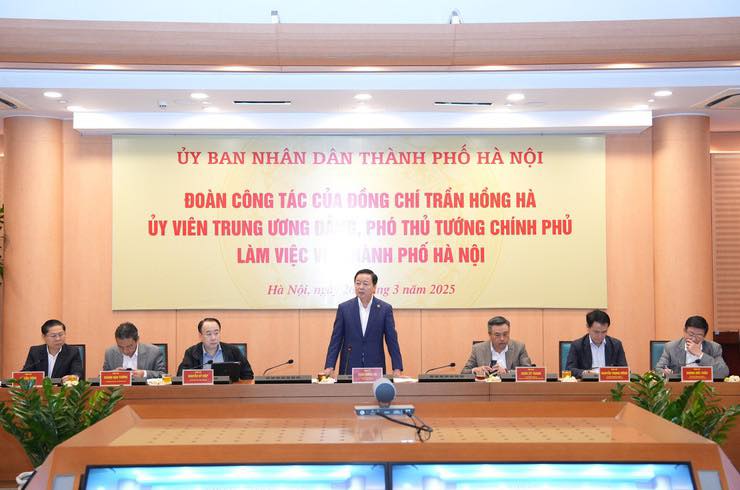Hanoi strengthens efforts to tackle air pollution
The new agency will enforce stricter measures, including emission tests for older motorbikes and economic tools to limit personal vehicles – in what officials describe as a "decisive move" to curb air pollution.
THE HANOI TIMES — Hanoi will set up a steering committee to tackle the city's worsening air pollution, a decisive move requested by Deputy Prime Minister Tran Hong Ha at the meeting with Hanoi's authorities this week.
The Ministry of Agriculture and Environment, along with Hanoi authorities and neighboring provinces, needs to complete the establishment of the committee by April 2025 to help the city grapple with hazardous air quality, largely caused by vehicle emissions.

Deputy Prime Minister Tran Hong Ha speaks at a working session with the Hanoi People's Committee on March 26. File Photo
Transportation is responsible for 56-65% of Hanoi’s air pollution, driven by a staggering 1.2 million cars and nearly eight million motorcycles, many of which are outdated and fail to meet emission standards, according to Le Kim Thanh, Vice Chairman of the National Traffic Safety Committee.
The alarming figures highlight the urgent need for stricter vehicle regulations and sustainable urban transport solutions.
"To combat pollution, relevant ministries and agencies must support Hanoi in implementing stricter emission standards for cars and motorcycles, urgently introducing mandatory emissions testing for motorcycles, and strengthening controls on pollution sources, including unregulated construction sites, uncovered transport of construction materials, and post-harvest burning of agricultural byproducts such as rice straw," Thanh said.
"At the same time, we need to speed up the transition to green transportation alternatives."
Deputy Prime Minister Tran Hong Ha said the new committee will prioritize devising stricter emission standards, adopting green transportation, and tightening controls on construction-related pollution.
In parallel, Hanoi will intensify digital traffic monitoring to automatically penalize offenders, while strengthening cooperation with Southeast Asian countries on cross-border pollution control. Road safety remains another pressing issue, with congestion and reckless driving persisting despite recent improvements. Authorities are focusing on expanding road infrastructure and stricter enforcement of traffic laws, including penalties for running red lights and driving on sidewalks.
The establishment of the committee is expected to be a decisive step towards cleaner air and safer streets in Hanoi, with concrete measures to be rolled out as early as next month.
The Capital Region Master Plan has identified environmental protection as a top priority among Hanoi's critical and urgent tasks for 2025-2030.
According to the Hanoi Department of Agriculture and Environment, numerous measures have been taken to reduce air pollution, including the development of comprehensive policies and action plans to better control emissions, notably the Hanoi Air Quality Management Plan to 2030 (with a vision to 2035).
The city has established an air quality forecasting system while implementing a roadmap for the introduction of Euro 4 and Euro 5 emission standards. Pilot programs for emissions testing of older motorcycles have been launched, while preparations are underway to test a Low Emission Zone.
The city's multi-pronged approach also includes expansion of the public transportation system, stricter enforcement of emission and dust control regulations, and promotion of cleaner production methods with environmentally friendly products. Advanced environmental models are being adopted, complemented by policies banning post-harvest straw burning.











